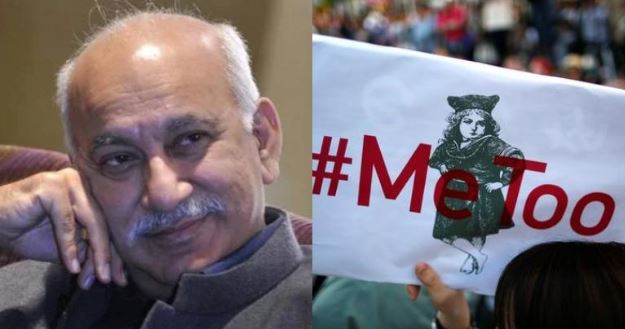Goa is abuzz with excitement as vintage bike and car owners, users, collectors and fans are decking […]

MeToo Rocks BJP’s AKBAR
INFOCUS, Oct 13- Oct 19 2018 October 13, 2018LET HIM GO? Calls for Akbar’s resignation have been increasing and it seems like it’s only a matter of time now. While neither the Congress nor the BJP have clean hands when it comes to Akbar, the current furore is putting the heat on the BJP
Compiled By GO Team
As me too rocks Indian media, one of the men being called the Harvey Weinstein of India is M J Akbar, who was one of the most well known journalists in India before he turned politician. Now as a minister in the BJP government at the Centre, his past may haunt both him and the government if they don’t take decisive action
The best way to eliminate poverty is to empower women. If you invest in women, you invest in future.” — This was a statement believed to have been made recently in Nigeria by India’s junior minister of external affairs MJ Akbar, quite ironic at present, given the myriad of sexual harassment charges piling up against him amid the #MeToo movement gaining ground in India.
“Ten of us have painted you a clear portrait of the media’s biggest sexual predator. How many more stories do you need to hear?” journalist Priya Ramani tweeted on Thursday, tagging the nine other women who made public in detail their experiences — some horrifying — with Akbar.
Women have recounted their ordeals with Akbar right from the 1980s till as recently as in in 2010-2011. Ranging from sexual harassment, sexism and abuse of power in his capacity as an editor, they recalled Akbar’s despicable behaviour.
It was Ramani’s tweet on Monday that triggered the initial outpouring of messages claiming sexual harassment charges against Akbar. One of them tweeted: “So many of us have an MJ story.” Little did we know the extent of what she meant by “many”.
Priya Ramani
On Monday, Ramani revealed that an article she wrote for the Vogue in October 2017, in light of the sexual harassment charges against Hollywood film producer Harvey Weinstein, that Akbar was the editor she had written about.
Without naming Akbar in the article, Ramani wrote how he had invited her to a hotel room in Mumbai for an interview and made uncomfortable advances towards her. She was 23 years old, while he was 43. “Turns out you were as talented a predator as you were a writer…” she wrote.
Prerna Singh Bindra
Writer and conservationist Prerna Singh Bindra also took to Twitter to recount her experience with Akbar.
“He was this brilliant, flamboyant editor who dabbled in politics, who called me — my first job — to his hotel room to ‘discuss work’ after I put the edition to bed — read midnight — and made life at work hell when I refused. Couldn’t speak up due to various compulsions, but yes #MeTooIndia. It was #MJAkbar I do not say this lightly… I know the consequences of false accusations and it has been now 17 years and I have no concrete proof,” she said.
Ghazala Wahab
Wahab’s could arguably be one of the most detailed and horrifying accounts which have come out since the #MeToo movement picked up pace in India, as well as among the women who have spoken up about their distressing encounters with Akbar.
In her article, Wahab wrote that during her initial years at the newspaper, she “accepted everything as part of the office culture — Akbar’s flirtation with young sub-editors, his blatant favouritism and his bawdy jokes”.
“His eyes fell on me. And my nightmare began,” the journalist wrote in an article for The Wire on the ordeal Akbar put her through during her time at The Asian Age. She goes on to narrate her harrowing experiences with Akbar, his persistence in trying to force himself on her in his cabin at The Asian Age office, the emotional tactics he resorted to when he realised his physical advances would not work and also how he got the newspaper’s tarot card columnist to tell her he really loved her.
“In the last 21 years, I had put all this behind me. I was determined not to be a victim and not let one monster’s debauchery ruin my career, even though occasionally I had nightmares. Maybe now the nightmares will stop,” she wrote in conclusion.
Shutapa Paul
Founder-Editor of NewCrop, Paul made public Akbar’s unwanted advances towards her and repeated invitations to his hotel room.
“MJ Akbar told me how journalists working together often ‘grew close’ and things could happen between them. He told me I should accompany him on his foreign visits,” Paul wrote, as she shared multiple instances of Akbar’s misconduct while they worked at India Today.
She wrote that after rejecting his advances multiple times, she “became completely invisible in the organisation”. “From a reporter who was doing impactful stories, I was relegated to being a nobody,” she said, adding that she was left with no choice but to quit India Today.
Kadambari M Wade
Another former journalist at The Asian Age, Wade took to Twitter to recount her ordeal in 1998 while working as a sport reporter at the newspaper with Akbar in charge.
In a thread of seven tweets, she highlighted how Akbar would always look at her chest while talking to her. “Sir, I’d much prefer if you’d look at my face instead of my chest when you’re talking to me,” she said she told him.
“Mr Akbar continued making me feel very uncomfortable till shortly thereafter, I fled. I came out and told Bobilli Vijay Kumar, my sports editor, but he laughed and said, ‘that’s just Akbar, don’t worry. He’s like that with everyone,” Wade shared on Twitter.
Harinder Baweja
It was journalist Baweja who tweeted, saying, “So many of us have an MJ story”, after Ramani’s first tweet calling Akbar out for harassing women he worked with. “Can I come over to your house with a bottle of rum?” was one of the tactics she said Akbar used.
Anju Bharti
In response to Ramani’s tweet, journalist Bharti shared how Akbar, during his time at India Today, got drunk at a party, “took females in a pool and had ‘fun’. She said it was at a party hosted by Aroon Purie.
Suparna Sharma
The current resident editor of The Asian Age, Suparna Sharma also accused Akbar of harassing her. Speaking to The Indian Express, Sharma said that she reported to Akbar from 1993 to 1996, and that during that time, he had plucked her bra strap and said something to her “which I don’t remember now” but made her scream at him.
She also recalled an incident in which she once went to Akbar’s cabin at the office, he kept staring at her chest breast and said something she ignored. Sharma also added that such incidents were routine with Akbar, and there were “no committees one could go to”.
Malini Bhupta
“I wasn’t junior and he made my life hell,” wrote Malini Bhupta, also in response to Ramani.
Bhupta said she was the deputy editor India Today when he used various tactics to “abuse and destroy you professionally, so you grovel”. “I didn’t relent so he wanted to sack me, but Mr (Aroon) Purie didn’t allow it. I quit in January 2011. It is abuse of power,” she shared on Twitter.
“Men like him are vermin… In 2010, I went on leave for three months after verbal abuse and intimidation. I then quit. Petty man wanted to sack me, and then refused to give a release letter.”
Kanika Gahlaut
The freelance journalist, too, spoke to The Indian Express to describe how Akbar’s behaviour towards everyone was inappropriate when she worked with him from 1995 to 1997.
“One did hear, from the beginning, from before we joined that MJ (Akbar) had a glad eye, and we were forewarned”. She said he “did it to everyone”.
Describing an incident, Gahlaut told The Indian Express that Akbar had invited her to a hotel room once, to which she agreed but did not show up. However, she added that Akbar “wouldn’t push” once he was told “no”, contrary to the accounts of the other women who had spoken out against him so far.
This is only a partial list of women who came out on record against Akbar, once considered the most powerful figure in the field of journalism. There are so many other women who have anonymously — for various reasons, primarily to prevent distressing their family — also shared their traumatic experiences while working with Akbar.
The #MeToo movement has gained momentum in India and support for the cause is only rising, as is the call for Akbar’s resignation or for the government to sack him.
Courtesy: Firstpost















